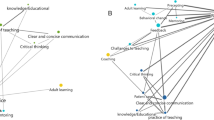Abstract
Background
The Accreditation Council for Graduate Medical Education (ACGME) requires faculty to pursue annual development to enhance their teaching skills. Few studies exist on how to identify and improve the quality of teaching provided by faculty educators. Understanding the correlation between numeric scores assigned to faculty educators and their tangible, practical teaching skills would be beneficial.
Objective
This study aimed to identify and describe qualities that differentiate numerically highly rated and low-rated physician educators.
Design
This observational mixed-methods study evaluated attending physician educators between July 1, 2015, and June 30, 2021. Quantitative analysis involved descriptive statistics, normalization of scores, and stratification of faculty into tertiles based on a summary score. We compared the highest and lowest tertiles during qualitative analyses of residents’ comments.
Participants
Twenty-five attending physicians and 111 residents in an internal medicine residency program.
Main Measures
Resident evaluations of faculty educators, including 724 individual assessments of faculty educators on 15 variables related to the ACGME core competencies.
Key Results
Quantitative analyses revealed variation in attending physician educators’ performance across the ACGME core competencies. The highest-rated teaching qualities were interpersonal and communication skills, medical knowledge, and professionalism, while the lowest-rated teaching quality was systems-based practice. Qualitative analyses identified themes distinguishing high-quality from low-quality attending physician educators, such as balancing autonomy and supervision, role modeling, engagement, availability, compassion, and excellent teaching.
Conclusions
This study provides insights into areas where attending physicians’ educational strategies can be improved, emphasizing the importance of role modeling and effective communication. Ongoing efforts are needed to enhance the quality of faculty educators and resident education in internal medicine residency programs.
Similar content being viewed by others

REFERENCES
Accreditation Council for Graduate Medical Education (ACGME) Faculty Survey/Common Program Requirements Crosswalk. (https://www.acgme.org/globalassets/pfassets/programresources/faculty-survey-common-program-requirements-crosswalk.pdf). Accessed 17 Mar 2023.
Goldszmidt M, Faden L, Dornan T, van Merrienboer J, Bordage G, Lingard L. Attending physician variability: a model of four supervisory styles. Acad Med 2015;90(11):1541-6. https://doi.org/10.1097/ACM.0000000000000735.
Grant AL, Torti J, Goldszmidt M. "Influential" Intraoperative Educators and Variability of Teaching Styles. J Surg Educ 2023;80(2):276-287. https://doi.org/10.1016/j.jsurg.2022.10.002.
Matthiesen M, Kelly MS, Dzara K, Begin AS. Medical residents and attending physicians' perceptions of feedback and teaching in the United States: a qualitative study. J Educ Eval Health Prof 2022;19:9. https://doi.org/10.3352/jeehp.2022.19.9.
Crockett C, Joshi C, Rosenbaum M, Suneja M. Learning to drive: resident physicians' perceptions of how attending physicians promote and undermine autonomy. BMC Med Educ 2019;19(1):293. https://doi.org/10.1186/s12909-019-1732-6.
Scheepers RA, Arah OA, Heineman MJ, Lombarts KM. In the eyes of residents good supervisors need to be more than engaged physicians: the relevance of teacher work engagement in residency training. Adv Health Sci Educ Theory Pract 2015;20(2):441-55. https://doi.org/10.1007/s10459-014-9538-0.
Jennings ML, Slavin SJ. Resident Wellness Matters: Optimizing Resident Education and Wellness Through the Learning Environment. Acad Med 2015;90(9):1246-50. https://doi.org/10.1097/ACM.0000000000000842.
Griffith CH, 3rd, Georgesen JC, Wilson JF. Specialty choices of students who actually have choices: the influence of excellent clinical teachers. Acad Med 2000;75(3):278-82. https://doi.org/10.1097/00001888-200003000-00020.
Eno C CR, Stewart NH, Lim J, Westerman ME, Holmboe ES, Edgar L. ACGME Milestones Guidebook for Residents and Fellows. (https://www.acgme.org/globalassets/pdfs/milestones/milestonesguidebookforresidentsfellows.pdf ). Accessed 17 Mar 2023.
Guerrero LR, Baillie S, Wimmers P, Parker N. Educational Experiences Residents Perceive As Most Helpful for the Acquisition of the ACGME Competencies. J Grad Med Educ 2012;4(2):176-83. https://doi.org/10.4300/JGME-D-11-00058.1.
Lee FY, Yang YY, Hsu HC, et al. Clinical instructors' perception of a faculty development programme promoting postgraduate year-1 (PGY1) residents' ACGME six core competencies: a 2-year study. BMJ Open 2011;1(2):e000200. https://doi.org/10.1136/bmjopen-2011-000200.
Litzelman DK, Stratos GA, Marriott DJ, Skeff KM. Factorial validation of a widely disseminated educational framework for evaluating clinical teachers. Acad Med 1998;73(6):688-95. https://doi.org/10.1097/00001888-199806000-00016.
MedHub. Minneapolis, MN.
Rose AJ, McCullough MB. A Practical Guide to Using the Positive Deviance Method in Health Services Research. Health Serv Res 2017;52(3):1207-1222. https://doi.org/10.1111/1475-6773.12524.
Mayring P. Qualitative content analysis: theoretical foundation, basic procedures and software solution. Klagenfurt2014.
Boerebach BC, Lombarts KM, Keijzer C, Heineman MJ, Arah OA. The teacher, the physician and the person: how faculty's teaching performance influences their role modelling. PLoS One 2012;7(3):e32089. https://doi.org/10.1371/journal.pone.0032089.
Myers KA, Zibrowski EM, Lingard L. A mixed-methods analysis of residents' written comments regarding their clinical supervisors. Acad Med 2011;86(10 Suppl):S21-4. https://doi.org/10.1097/ACM.0b013e31822a6fd3.
van der Leeuw RM, Schipper MP, Heineman MJ, Lombarts KM. Residents' narrative feedback on teaching performance of clinical teachers: analysis of the content and phrasing of suggestions for improvement. Postgrad Med J 2016;92(1085):145-51. https://doi.org/10.1136/postgradmedj-2014-133214.
Author information
Authors and Affiliations
Corresponding author
Additional information
Publisher’s Note
Springer Nature remains neutral with regard to jurisdictional claims in published maps and institutional affiliations.
Prior Presentations
None
Rights and permissions
Springer Nature or its licensor (e.g. a society or other partner) holds exclusive rights to this article under a publishing agreement with the author(s) or other rightsholder(s); author self-archiving of the accepted manuscript version of this article is solely governed by the terms of such publishing agreement and applicable law.
About this article
Cite this article
Pope, B.A., Carney, P.A., Brooks, M.C. et al. Resident Assessment of Clinician Educators According to Core ACGME Competencies. J GEN INTERN MED 39, 377–384 (2024). https://doi.org/10.1007/s11606-023-08496-7
Received:
Accepted:
Published:
Issue Date:
DOI: https://doi.org/10.1007/s11606-023-08496-7



